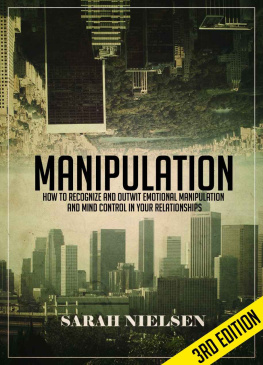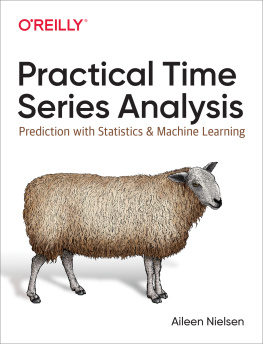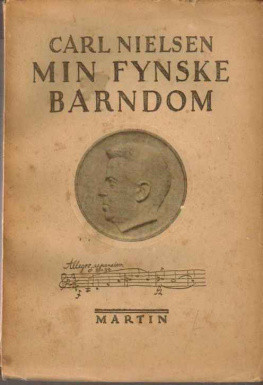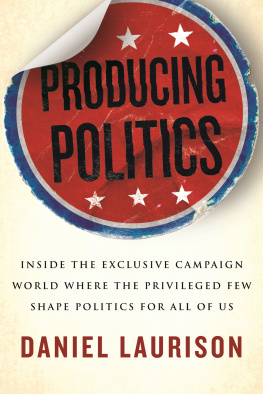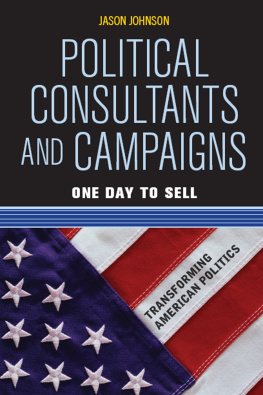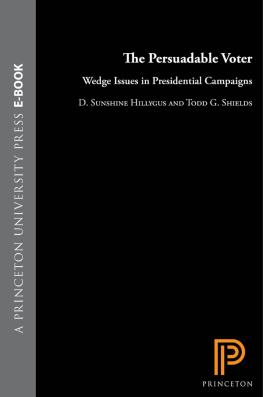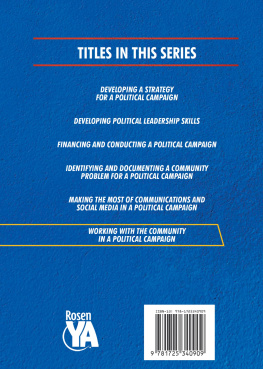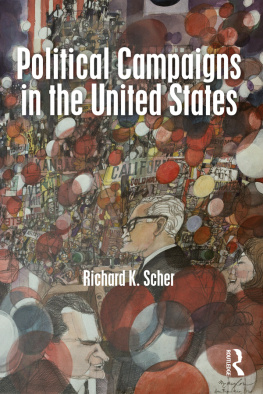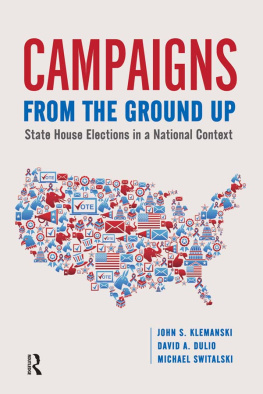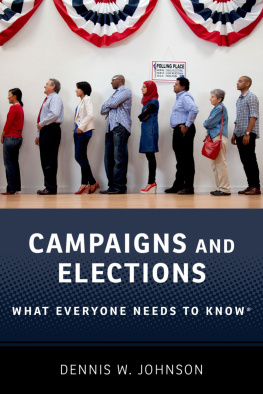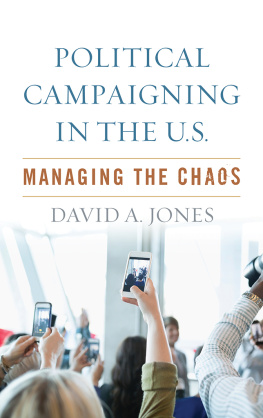Ground Wars

Ground Wars
PERSONALIZED COMMUNICATION IN
POLITICAL CAMPAIGNS
Rasmus Kleis Nielsen

Copyright 2012 by Princeton University Press
Published by Princeton University Press, 41 William Street, Princeton, New Jersey 08540 In the United Kingdom: Princeton University Press, 6 Oxford Street, Woodstock, Oxfordshire OX20 1TW
press.princeton.edu
All Rights Reserved
Library of Congress Cataloging-in-Publication Data
Nielsen, Rasmus Kleis, 1980
Ground wars : personalized communication in political campaigns / Rasmus Kleis Nielsen.
p. cm.
Includes bibliographical references and index.
ISBN 978-0-691-15304-9 (cloth : alk. paper)ISBN 978-0-691-15305-6 (pbk. : alk. paper) 1. Political campaignsUnited StatesHistory21st century. 2. Communication in politicsUnited StatesHistory21st century. I. Title.
JK2281.N54 2012
324.7'30973 dc23
2011032746
British Library Cataloging-in-Publication Data is available
This book has been composed in Sabon
Printed on acid-free paper.
Printed in the United States of America
10 9 8 7 6 5 4 3 2 1
Contents
Prologue
Welcome to the Campaigns
CHAPTER 1
Personalized Political Communication in American Campaigns
CHAPTER 2
The Ground War Enters the Twenty-first Century
CHAPTER 3
Contacting Voters at Home
CHAPTER 4
Organizing Campaign Assemblages
CHAPTER 5
Targeting Voters for Personal Contacts
CHAPTER 6
Always Fighting the Same Ground War?
Never doubt that a small group of thoughtful, committed citizens
can change the world; indeed, its the only thing that ever has.
President Jed Bartlet in Aaron Sorkins The West
Wing (originally attributed to Margaret Mead)
There is so little one can do. [Pause.] One does it all. [Pause.]
All one can.
Winnie in Samuel Becketts Happy Days
Acknowledgments
While working on this book, I have enjoyed the intellectual and academic opportunities that Columbia University and the many other great universities in and around New York City offer. I have learned much from my teachers, colleagues, and friends in the PhD program in Communications; from the CODES seminar and Contentious Politics workshop organized through the Department of Sociology at Columbia; from seminars in the Mellon Graduate Fellows Program hosted by ISERP; from the Politics and Protest workshop at the Graduate Center, CUNY; and from frequent visits to and conversations with people from the New School for Social Research and NYU. Through the good offices of Yochai Benkler, I also had the opportunity to work for six weeks at the Berkman Center for Internet and Society at Harvard University in the summer of 2009. The final push for this book came while I was working on other projects at the Reuters Institute for the Study of Journalism at the University of Oxford in the United Kingdom, and while waiting to take up a new position at Roskilde University (RUC) in Denmark.
Many friends and colleagues have taken the time to read and comment on parts of my work. I like to think of academic work as a form of intellectual craftsmanship embedded in a community of inquiry, and I am grateful to the people who at various points have helped me realize that idea. I would like to thank in particularthough in no particular orderAmy Stuart, Benjamin Peters, Chris W. Anderson, Daniel Kreiss, David Karpf, Frank Moretti, Elena Krumova, James M. Jasper, Jonah Bossewitch, Josh Whitford, Lucas Graves, Monique Girard, Quinn Mulroy, Robbie McClintock, Ruthie Palmer, Solon Barocas, Tom Ogorzalek, W. Russell Neuman, and the late Charles Tilly. All of them have helped me along the way.
If I ever advise someone on their road toward a PhD, I hope I can offer what Michael Schudson offered me while I was at Columbiaconstant encouragement to follow my own intuitions, tempered with attentive criticism and close readings of all I sent him, and an appropriate dose of skepticism and uncommonly common sense when I got carried away (which I do). He stands as a model of intellectual integrity and the right kind of ambition for me, and it has been a privilege to work with him. In their own ways, both David Stark and Todd Gitlin have pushed me to improve my work. David never ceases to be able to reframe my own understanding of what I am doing, and he leads by example when it comes to pushing academic work beyond the confines of what any individual researcher can accomplish by maintaining a wonderful intellectual community around him. Todd never let me forget the big questions that lurkand should lurkbehind our otherwise specialized academic endeavors.
What little I knew about ethnographic fieldwork when I started this project I learned from Herbert J. Gans, a master craftsman still passing on the craft, and he has kindly commented on several chapters along the way. Rodney Benson and Rogers M. Smith read through the manuscript, and both of them taught me much about my own work, things that have helped move this piece of work to becoming a book. David Karpf, Daniel Kreiss, and Herbert J. Gans all went far beyond the call of duty and read the entire revised book manuscript in the fall of 2010. They have given me more constructive criticism than I could possible hope to process. Two anonymous reviewers provided both encouragement and further possibilities to pursue. My editor at Princeton University Press, Eric Schwartz, has been exemplary in nudging me along toward completion; it has been a pleasure to work with him as well as with Beth Clevenger and Janie Chan, who both helped with production. Senior people at VAN not only gave me their time, but also permission to reprint screenshots of their companys work. I thank all of the above for their time and effort, and acknowledge that it is my responsibility alone that I have not responded effectively to all of their thoughtful comments. I will build on all they have taught me in the future. You never stop learning, nor should you.
My family has been unflagging in their support of my work as an academic and my decision to pursue my vocation a world and some six thousand kilometers away. Though we have spent years far from each others everyday lives, I have never felt that we were truly separated. What we share I appreciate more and more. Martha Pichardoalways my first reader, my first critic, and so much morehas lived with this project for years. It would be embarrassing for both of us if I tried to put into writing how much I owe her, so I wont. I will try to show it instead.
I feel privileged to have been in a position to do the research for this book, and I am deeply grateful for all the help I have received along the way. But this project is not simply the outcome of my own intellectual endeavors and the environment in which I found myself. It is also the result of an extensive engagement with the realities of electoral politics. I have learned more from the people involved in campaigns than I can ever hope to teach them, and I thank them all for letting me into their world. Insofar as what follows can repay some of my debt, it is because I have had an opportunity to see campaigns from many different perspectives and have had more time to think about what I saw than any staffer, volunteer, or part-timer. If I can convey these different views effectively enough, even seasoned campaigners may be surprised to learn about how what they do looks to others.
Ground Wars
Next page

